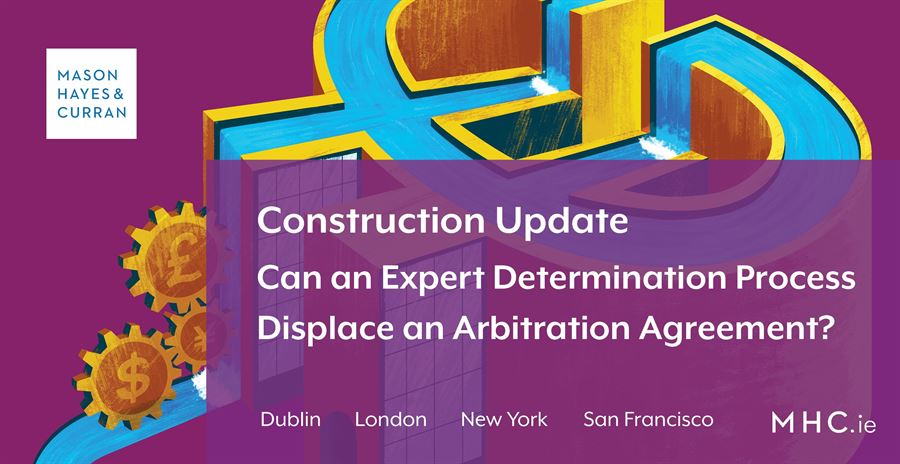
In K&J Townmore Construction Limited v Kildare and Wicklow Education and Training Board[1], the High Court determined that an agreement between a building contractor (the Contractor) and the employer (the Board) for an expert determination process had the effect of disapplying the conciliation and arbitration clauses contained in the underlying building contract.
Background
The Board entered a Public Works Contract with the Contractor for construction works at a school in Kildare. Clause 13.1 of the Public Works Contract contains detailed provisions providing for the conciliation of disputes. Clause 13.2 of the Public Works Contract provides an arbitration agreement. Under Clause 13.2 “any dispute that, under sub-clause 13.1, may be referred to conciliation” will be finally settled by arbitration if not first settled in conciliation.
Expert determination agreement
 Disputes arose between the parties, however instead of referring these to conciliation, the parties agreed to enter into an expert determination process under which an expert was appointed on agreed terms. The expert determination agreement conferred wide powers and jurisdiction on the expert to determine the disputes referred to it and it was agreed that any determination made would be considered “binding” on the parties.
Disputes arose between the parties, however instead of referring these to conciliation, the parties agreed to enter into an expert determination process under which an expert was appointed on agreed terms. The expert determination agreement conferred wide powers and jurisdiction on the expert to determine the disputes referred to it and it was agreed that any determination made would be considered “binding” on the parties.
Effect on the arbitration agreement
The parties agreed that the expert determination process supplanted part of Clause 13, though disagreed on the extent. The defendant contended that the agreement for expert determination only supplanted the conciliation provisions in Clause 13.1, but left intact the arbitration provisions contained in Clause 13. Therefore, the court should make an order under Article 8(1) of the Model Law referring the disputes to arbitration. The plaintiff claimed however that the expert determination agreement supplanted both the provisions of Clause 13.1 and 13.2 and, therefore, there was no operative arbitration agreement.
Court judgment
Mr Justice Barniville noted that the expert determination agreement did not expressly state the effect the agreement was intended to have on Clause 13.1. and Clause 13.2. Therefore, the court was required to interpret the terms of the expert determination agreement on the basis of the principles set out by Lord Hoffman in Investors Compensation Scheme Limited v West Bromwich Building Society.[2]
Construing the expert determination agreement as a whole, the court found that the parties' intention was that the determinations to be issued by the expert would be both “final” and “binding”. In particular in this regard, the court found that irrespective of whether an expert determination was expressly stated to be “final and binding” or not, the case law supports the position that they are “final and binding” owing to the expert’s position as “expert”. The judge also found that in any event, as the disputes referred to the expert determination process are not disputes that could be referred to conciliation (owing to the expert determination agreement), Clause 13.2 could not apply to those disputes and therefore Clause 13.2 was inoperative.
Conclusion
One of the essential requirements for the mandatory provisions of Article 8 to come into effect is that the action must concern a “matter which is the subject of an arbitration agreement.” While the courts have routinely held that Article 8 is mandatory, and generally adopt a broad approach to the interpretation of arbitration agreements, this case demonstrates the need for parties to carefully consider the effect which an agreement to engage in other forms of alternative dispute resolution may have on any existing arbitration agreement. Ideally, the intended effect should be expressly set out to avoid ambiguity.
For more information on successfully engaging in alternative forms of dispute resolution for your projects, contact a member of our Construction & Engineering team.
The content of this article is provided for information purposes only and does not constitute legal or other advice.
[1] [2019] IEHC 666 - not be confused with another decision of Mr Justice Barniville between the same parties
[2] [1998] 1 W.L.R. 896



